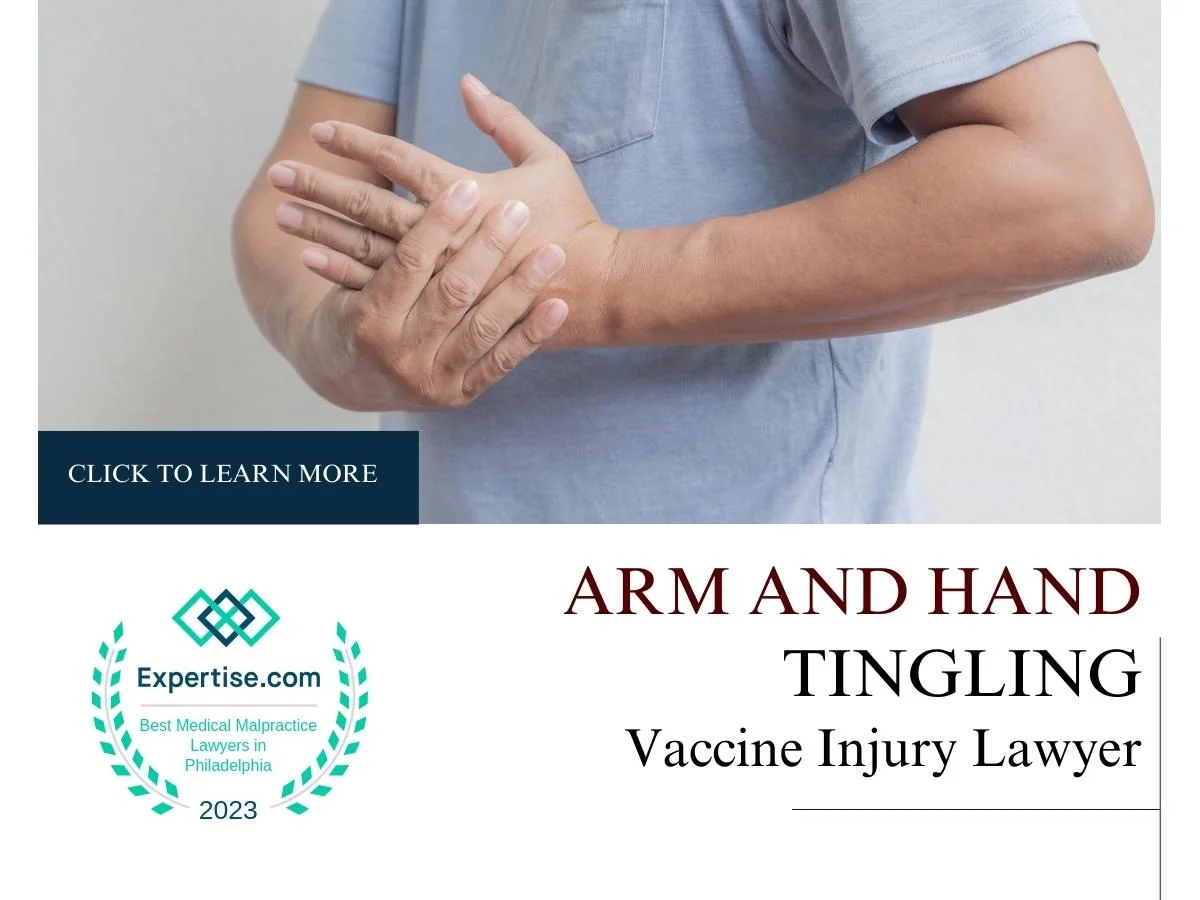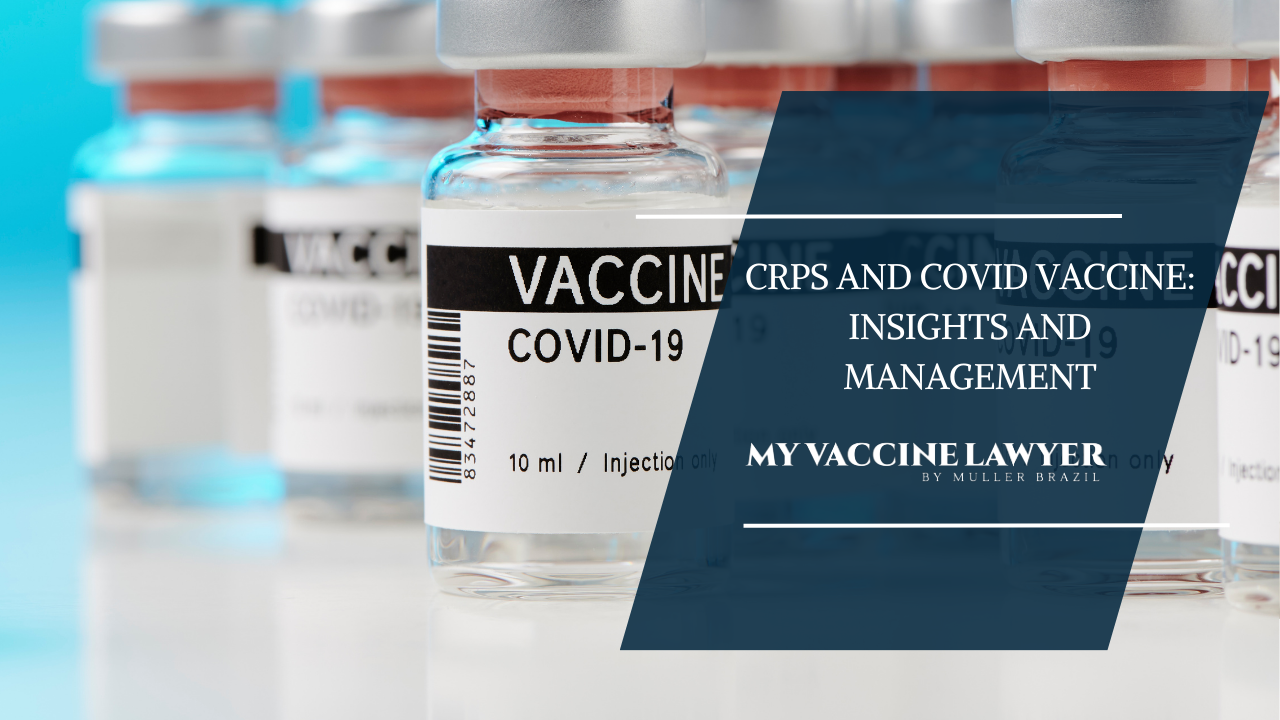Tingling After Flu Shot: Causes and Solutions
If you have recently received a flu shot and are experiencing tingling sensations in your arm and hand, you may be concerned about the possible side...
6 min read
Vaccine Injury Law Resources / Leigh Finfer / CRPS and COVID Vaccine: Insights, Management, and Legal Guidance
 Leigh Finfer
:
Mar 26, 2024 8:36:36 AM
Leigh Finfer
:
Mar 26, 2024 8:36:36 AM
The National Organization for Rare Disorders states that Complex Regional Pain Syndrome (CRPS) affects approximately 200,000 individuals in the United States annually.
Complex Regional Pain Syndrome (CRPS) is a condition that causes severe, ongoing pain, usually in one limb. It can happen after an injury, surgery, or rarely, following a vaccination like the COVID-19 vaccine. Although it's uncommon, there have been a few reports of CRPS after COVID-19 vaccinations.
Treating CRPS involves medications, physical therapy, and support for mental health. It's important to diagnose and start treatment quickly to improve recovery. If CRPS develops after a vaccine, patients may also have legal options for compensation through specific programs like the Vaccine Injury Compensation Program.
Complex Regional Pain Syndrome (CRPS) is a painful and debilitating condition that typically affects a limb after injury or surgery, characterized by severe, persistent pain and sensory disturbances.
The COVID-19 vaccination campaign has been instrumental in the battle against the virus. However, it has also opened up new insights into understanding CRPS. While CRPS has historically appeared after immunization, a few cases have surfaced post-COVID-19 vaccination. This draws attention to the need for healthcare providers to be vigilant of this potential association.
CRPS remains a mystery with its unpredictable occurrence and variable severity. A single reported case of CRPS directly following a COVID-19 vaccine in the clinical literature has sparked a curiosity to explore this connection further. The rarity of these cases makes the investigation challenging, yet essential.
The infrequency of CRPS post-COVID-19 vaccination cases has presented a unique clinical picture. A 17-year-old woman, with no prior medical history, experienced severe pain and swelling after her second dose of an mRNA-based vaccine.
Another case involved a 33-year-old experiencing an array of symptoms like severe pain, heaviness, swelling, and decreased range of motion after vaccination.
Symptoms of complex regional pain syndrome (CRPS) include:
These symptoms, often associated with reflex sympathetic dystrophy, are worsened by the slightest touch or persistent involuntary movements. While it can be uncomfortable, worsening CRPS symptoms after getting the vaccine generally doesn't last long and can be handled with appropriate treatment adjustments.
Healthcare providers need to be aware of such signs and be prepared to manage these cases effectively. The puzzle of CRPS post-vaccination intrigues the medical world and calls for further investigation and understanding.
Researchers are still investigating the potential causes of CRPS post-vaccination. One possible explanation is injection trauma during vaccine administration. Another theory suggests that mRNA-based COVID-19 vaccines may create an intensified autoimmune response. This potentially contributes to the worsening of CRPS symptoms.
Currently, vaccinations are not associated with an increased risk of immune-mediated neurological events. However, the theory of an immune-mediated response to vaccination components triggering CRPS is under consideration. Investigating these potential causes is key to devising preventive strategies and immediate treatment plans.

Recognizing CRPS symptoms post-vaccination early contributes to better management and prevention of severe complications. These symptoms include:
Often, an early diagnosis can characterize the initial presentation of the condition.
Patients have reported symptoms such as a bruise on the back of the hand that spreads, becomes swollen and severely painful to the touch. These initial symptoms can progress to numbness and involuntary flexion of the entire hand and left-hand finger for example, including the left index finger.
Severe pain and swelling may persist in the affected limb, despite the reducing visible signs of bruising, including the left forearm and left upper arm reducing, or the entire left hand extending in an unnatural position. In this context, the left upper extremity refers to the entire affected area, from the left upper arm to the left index finger.
Actively seeking medical help upon noticing these symptoms is key to managing CRPS. Early medical consultation helps prompt diagnosis and treatment and prevents complications like tissue wasting or muscle atrophy.
Management of CRPS after vaccination is not a simple task. It requires a blend of:
The approach is personalized for each patient, considering the severity and progression of their condition.
Pharmacological interventions are important for CRPS management strategy. One patient, for instance, managed an acute worsening of CRPS symptoms after COVID-19 vaccination with a lumbar sympathetic block and medications like diphenhydramine, lorazepam, baclofen, and hydromorphone.
While nonsteroidal anti-inflammatory drugs (NSAIDs) like ibuprofen are commonly used for treating pain stemming from injuries that trigger CRPS, they are not directly effective for CRPS pain itself.
Anticonvulsants such as gabapentin and pregabalin are used to treat nerve pain despite potential side effects. Tricyclic antidepressants and opioids form part of the pharmacological management for nerve pain and severe CRPS pain, respectively, with caution advised concerning the side effects and risk of dependency.
For cases where other treatments do not relieve the pain, advanced interventions like the following are considered:
Preventive treatment strategies such as adjusting current medications, introducing new ones, or receiving the hepatitis b vaccine before further vaccination may help avoid worsening CRPS symptoms.
Physical rehabilitation for CRPS aims to improve activities and function without increasing pain. Techniques like desensitization and graded motor imagery are commonly used. The rehabilitation begins with gentle movements to manage edema and preliminary desensitization, progressing through stress loading and aerobic training for gradual improvement.
Aquatic therapy offers several benefits for physical rehabilitation, including:
These benefits can contribute to the successful rehabilitation of patients.
Psychological support is important in CRPS management. The condition can cause distress, leading to psychological issues such as anxiety and depression. A range of psychological therapies, including:
Therapies for pain relief are used to help CRPS patients manage their mental health issues.
Stress exacerbates pain in CRPS patients. This emphasizes the need for effective stress management techniques and promoting the acceptance of the condition as part of psychological coping strategies.
Healthcare professionals, including psychologists, are often part of a multidisciplinary team working together to address the emotional impact and improve the overall welfare of individuals with CRPS.
Take Control of Your Injury Today
The legal aspects relevant to vaccine-related CRPS also require your attention. The Vaccine Injury Compensation Program (VICP) provides a no-fault alternative for individuals diagnosed with vaccine-related CRPS to seek compensation. Patients who develop CRPS following vaccination may be eligible for compensation from the federal government by filing a petition with the U.S. Court of Federal Claims, where a special master decides on compensation after a medical and legal review.
Legal representation can be of great help in navigating this process. Victims of vaccine-related CRPS can obtain legal representation to file a VICP claim, with provisions allowing attorneys to request separate reimbursement from the Federal Vaccine Court for their fees and costs.
If you believe you may have suffered from Complex Regional Pain Syndrome (CRPS) as a result of a COVID-19 vaccination, it is important to explore your legal options. Contact My Vaccine Lawyer to discuss your case. Our experienced team is dedicated to advocating for your rights and guiding you through seeking compensation. Don't navigate this journey alone; reach out to us for the support and representation you deserve.
Timely recognition and treatment of CRPS can reduce the risk of complications and improve the quality of life. In case of suspicion of vaccine-related injury, particularly for complex conditions like CRPS, one should consider seeking legal counsel.
A specialized CRPS lawyer can help advocate for patients’ rights and ensure they receive fair compensation for the extensive treatment CRPS may require. If symptoms linked to a recent COVID-19 vaccination persist or worsen despite treatment, consulting with a lawyer experienced in CRPS cases is advisable.
CRPS presents a formidable challenge, particularly when it intersects with the COVID-19 vaccination efforts—a rare but distressing phenomenon.
The problem lies in the mysterious nature of CRPS, which, when potentially triggered by vaccination, demands prompt recognition and a robust management strategy to mitigate its severe and life-altering symptoms.
Patients and healthcare providers alike feel this. The solution involves a full approach: early detection, individualized treatment plans, and the support of legal mechanisms to ensure that those affected are not left to face the consequences alone.
As the world grapples with the pandemic, vigilance against rare complications like CRPS is important for improving our ability to respond effectively and empathetically to those in need.
CRPS does not directly affect life expectancy, but if treatment does not work and symptoms persist, it could lead to serious lifelong disability, potentially resulting in other health issues that may reduce life expectancy.
Yes, you can develop complex regional pain syndrome (CRPS) after an injection, but it is uncommon and may have variable manifestations that could delay diagnosis and treatment.
Yes, there is a documented case of complex regional pain syndrome (CRPS) occurring in the upper extremities following COVID-19 vaccination.
CRPS is a chronic pain condition that can occur after an injury. Some individuals have reported CRPS after receiving the COVID-19 vaccine, prompting an investigation into a potential link.
If you have been diagnosed with vaccine-related CRPS, you may seek compensation through the Vaccine Injury Compensation Program with the help of a legal representative. This can be beneficial in navigating the process.
Leigh A. Finfer is a vaccine and personal injury attorney at Muller Brazil and My Vaccine Lawyer. Mrs. Finfer has been with the firm since June 2018 and her practice includes representing vaccine injury victims, personal injury victims, and those who suffer injuries as a result of unsafe drugs and medical devices.

If you have recently received a flu shot and are experiencing tingling sensations in your arm and hand, you may be concerned about the possible side...

Vaccines are a critical part of public health, helping to protect us from serious and potentially deadly diseases. However, there is mounting...

Developing adhesive capsulitis, or "frozen shoulder," after a vaccination, can be painful and limit your movement. This condition occurs when the...
